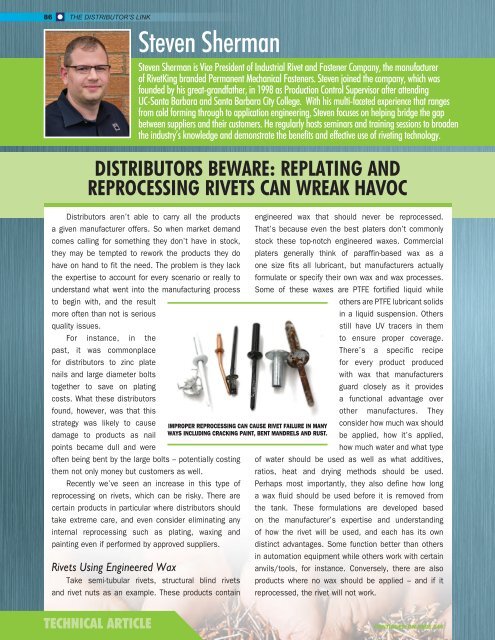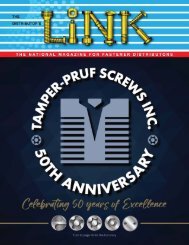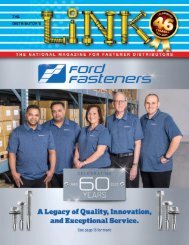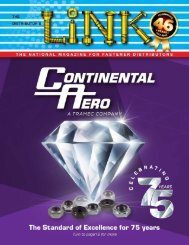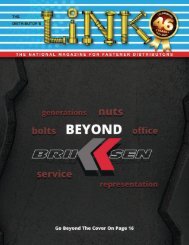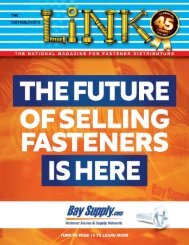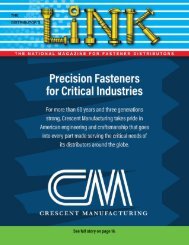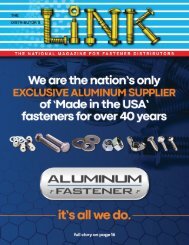SPRING 2018
Distributor's Link Magazine Spring 2018 / Vol 41 No2
Distributor's Link Magazine Spring 2018 / Vol 41 No2
Create successful ePaper yourself
Turn your PDF publications into a flip-book with our unique Google optimized e-Paper software.
86<br />
THE DISTRIBUTOR’S LINK<br />
Steven Sherman<br />
Steven Sherman is Vice President of Industrial Rivet and Fastener Company, the manufacturer<br />
of RivetKing branded Permanent Mechanical Fasteners. Steven joined the company, which was<br />
founded by his great-grandfather, in 1998 as Production Control Supervisor after attending<br />
UC-Santa Barbara and Santa Barbara City College. With his multi-faceted experience that ranges<br />
from cold forming through to application engineering, Steven focuses on helping bridge the gap<br />
between suppliers and their customers. He regularly hosts seminars and training sessions to broaden<br />
the industry’s knowledge and demonstrate the benefits and effective use of riveting technology.<br />
DISTRIBUTORS BEWARE: REPLATING AND<br />
REPROCESSING RIVETS CAN WREAK HAVOC<br />
Distributors aren’t able to carry all the products<br />
a given manufacturer offers. So when market demand<br />
comes calling for something they don’t have in stock,<br />
they may be tempted to rework the products they do<br />
have on hand to fit the need. The problem is they lack<br />
the expertise to account for every scenario or really to<br />
understand what went into the manufacturing process<br />
to begin with, and the result<br />
more often than not is serious<br />
quality issues.<br />
For instance, in the<br />
past, it was commonplace<br />
for distributors to zinc plate<br />
nails and large diameter bolts<br />
together to save on plating<br />
costs. What these distributors<br />
found, however, was that this<br />
strategy was likely to cause<br />
damage to products as nail<br />
points became dull and were<br />
often being bent by the large bolts – potentially costing<br />
them not only money but customers as well.<br />
Recently we’ve seen an increase in this type of<br />
reprocessing on rivets, which can be risky. There are<br />
certain products in particular where distributors should<br />
take extreme care, and even consider eliminating any<br />
internal reprocessing such as plating, waxing and<br />
painting even if performed by approved suppliers.<br />
Rivets Using Engineered Wax<br />
Take semi-tubular rivets, structural blind rivets<br />
and rivet nuts as an example. These products contain<br />
IMPROPER REPROCESSING CAN CAUSE RIVET FAILURE IN MANY<br />
WAYS INCLUDING CRACKING PAINT, BENT MANDRELS AND RUST.<br />
engineered wax that should never be reprocessed.<br />
That’s because even the best platers don’t commonly<br />
stock these top-notch engineered waxes. Commercial<br />
platers generally think of paraffin-based wax as a<br />
one size fits all lubricant, but manufacturers actually<br />
formulate or specify their own wax and wax processes.<br />
Some of these waxes are PTFE fortified liquid while<br />
others are PTFE lubricant solids<br />
in a liquid suspension. Others<br />
still have UV tracers in them<br />
to ensure proper coverage.<br />
There’s a specific recipe<br />
for every product produced<br />
with wax that manufacturers<br />
guard closely as it provides<br />
a functional advantage over<br />
other manufactures. They<br />
consider how much wax should<br />
be applied, how it’s applied,<br />
how much water and what type<br />
of water should be used as well as what additives,<br />
ratios, heat and drying methods should be used.<br />
Perhaps most importantly, they also define how long<br />
a wax fluid should be used before it is removed from<br />
the tank. These formulations are developed based<br />
on the manufacturer’s expertise and understanding<br />
of how the rivet will be used, and each has its own<br />
distinct advantages. Some function better than others<br />
in automation equipment while others work with certain<br />
anvils/tools, for instance. Conversely, there are also<br />
products where no wax should be applied – and if it<br />
reprocessed, the rivet will not work.<br />
TECHNICAL ARTICLE<br />
CONTINUED ON PAGE 146


